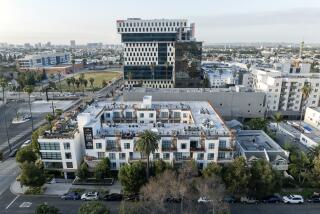Apartment Complex’s Common Areas Can Legally Be Off-Limits
- Share via
Question: I live in a 60-unit apartment complex in Downey. There is a large grassy area on one side, and a pool surrounded by a good-sized concrete area with flower beds on the other side.
Attached to the lease is a list of rules. One of them states, “All residents must stay off of all trees and landscaping.” The tenants are not allowed on the grassy area.
Recently, the managers have begun telling tenants that they can’t be outside (on the balconies and concrete areas) at all because, “There’s no loitering allowed.” Is this legal? Is it considered loitering on private property where we pay rent?
Answer: It is not uncommon for apartment owners to prohibit their renters from using the common areas of a complex (trees, landscaping, paved areas and balconies, except those balconies that are part of units) for recreational or other activities.
You can easily understand, for reasons of liability, why owners wouldn’t want tenants climbing trees. (Tenants frequently sue property owners for negligence when they hurt themselves on rental properties, regardless of the circumstances of the injuries.)
Other prohibitions, such as no loitering on the grassy areas or balconies, may be harder to understand. They are, nevertheless, legal.
Your letter states that the lease specifically says, “Residents must stay off all trees and landscaping.” You may want to recheck language in the lease further because many contain additional common-area prohibitions.
Even if the lease does not further prohibit common-area activities now, the owners could give you a 30-day notice to change the terms of your tenancy, prohibiting such activities, when the lease expires.
Managers, at any time, can give tenants with month-to-month agreements a 30-day notice to change the terms of their tenancy.
If you create too much trouble, the owners can refuse to renew your lease when it expires, and require you to move out of the apartment.
Clarifying Laws on Relocation Fees
Q: In your July 30 column (“No Waiver Can Legally Void Relocation Fee”), you indicate that any agreement between a landlord and tenant regarding waiving relocation fees is unenforceable.
What if there is a lease signed that says that the tenant has to move out at the expiration of the lease under the terms of the lease? Is the tenant still entitled to relocation fees in this scenario?
A: The previous question dealt with a tenant living in Los Angeles in an apartment covered by the city’s rent-control law. The tenant had signed a lease upon moving into the unit, before being asked to move.
The lease said he “waived any and all rights for relocation fee as it is required by city of Los Angeles.” As I said in the column, this provision in the lease is illegal and unenforceable under the rent law. Similarly, a clause in a lease requiring the tenant to move out at the expiration of the lease is illegal and unenforceable under the city’s rent-control law.
A landlord does not have to renew the lease, but must allow the tenant to stay in the apartment under a month-to-month agreement, to which, upon expiration, the lease automatically converts under state law.
A tenant, on the other hand, under rent control must sign a lease renewal, of similar duration and terms, if the landlord requires it. The landlord may evict if the tenant refuses to sign the renewal.
If the owner subsequently asks the tenant to move in a no-fault eviction, relocation fees would have to be paid to the vacating tenant, as in the previous question.
No-fault evictions are those in which the tenant has done no wrong. Such evictions can include owner move-ins or condo conversions.
Renters can be required to move at the end of a lease term in jurisdictions such as Downey, where there is no rent control. Also, relocation fees are not required there under any circumstances.
*
Postema is the editor of Apartment Age magazine, a publication of AAGLA, an apartment owners’ service group. Mail your questions on any aspect of apartment living to AAGLA, 12012 Wilshire Blvd., Los Angeles, CA 90025.
More to Read
Inside the business of entertainment
The Wide Shot brings you news, analysis and insights on everything from streaming wars to production — and what it all means for the future.
You may occasionally receive promotional content from the Los Angeles Times.










